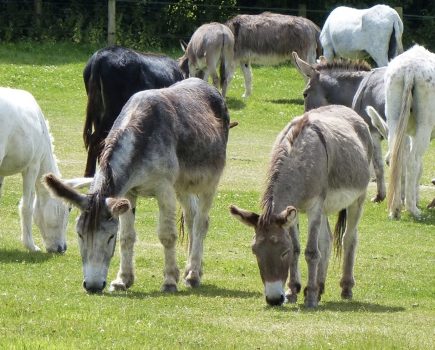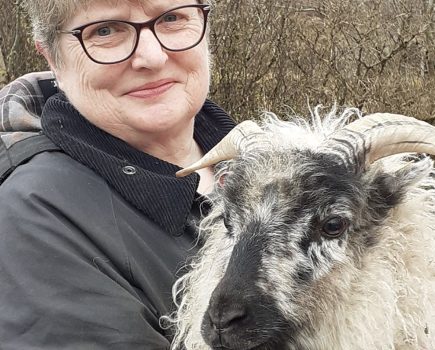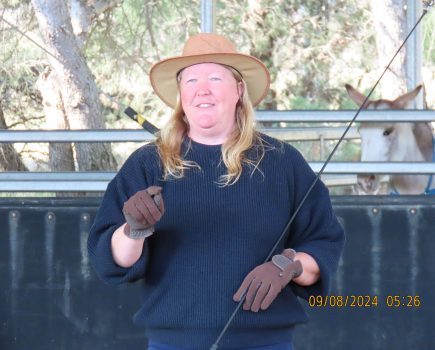So you want to buy Alpacas? Rob Bettinson from the British Alpaca Society advises
It’s nearly eight years now since I bought my first alpacas but I can still remember that shaky feeling of parting with a very large wodge of the family silver and embarking on a journey into the unknown. Even though I had researched my subject thoroughly, at the moment of impact when exchanging cash for animals, I was deeply unsure as the demons of wisdom and madness wrestled in my head. Now, eight years on (and a great deal wiser), those demons have subsided but I know from dealing with new owners myself that the buying of your first alpacas can be akin to buying a house and, for some, nearly as expensive and no less traumatic.
How do you go about buying your first alpacas?
Do your homeworkNowadays you can do a lot of your initial research at leisure from your home. The internet is a great provider of information – sometimes too much – but if you know your way around and are prepared to put in the time, you can get a glimpse, not only of different herds in the UK who have very informative and detailed websites but also an insight into the US and Australia, regions where the alpaca industry is far more advanced than our own. It’s a vision of the future that is well worth exploring.
Join the British Alpaca Society (BAS)As a member you have access to all the information available to the society. On enquiry you will be given a list of all the registered BAS members in your specific location. On joining the society, you will be receive a list of every breeder in the country, and also all the major information regarding the societies’ activity, structure, policy, guidelines etc. You will have access to the members’ area through the society website. You will receive a quarterly magazine dealing with current news, events and informative articles on alpacas applicable to the novice and experienced alike. You will have the support of the society welfare hotlines and infrastructure of the society through which you are able, if you ask, to get informative, objective answers and qualification to all our enquiries large or small, either through email or phone call.
Invest in a courseThe BAS run alpaca assessment days throughout the year aimed at educating the newly smitten on what to look for in an alpaca – its fleece, colour etc. Numerous breeders throughout the UK run similar private courses in husbandry, welfare and general alpaca maintenance. It’s a great way for the interested but uncommitted to get ‘hands on’ and, considering the investment you will eventually make, it’s a small price to pay for the knowledge gained.
Visit the alpaca shows The show ring is the display case of the industry. It’s the place where you should see the best. Eventually you will have to make a decision on price and value. To do this, you have to get a perspective on the market place both at the top and the bottom. Alpacas vary in quality, pedigree and there are price ranges to suit all. To make a good value purchase it’s important to know what the top-priced animals look like, and the lowest priced, to get a perspective and to feel secure in the value of your final purchase.
Talk to breeders and ownersDiscuss ideas with breeders and owners throughout the UK not only in your own area. The magic of the alpaca is its progression and improvement through selective breeding. Breeders are pursuing their own ideals – herd management, breeding policies etc. They are creating their own alpaca lifestyles to their own visions that satisfy their own adventure. Stock can differ widely from farm to farm, as can attitude to sales and after sale support. Prices of stock can vary from county to county. To gain perspective you need to experience the contrast.
Ask the questionsIf you are not prepared to ask you will never get the answers. If you don’t get answers and the owner/breeder is unwilling or reluctant to expend time and energy talking about alpacas or preparing you for ownership, then this is not somebody you want to buy an alpaca from. Let them go and move on, there are 600-800 alpaca owners in the UK, the majority of whom are besotted with the alpaca, its welfare and its future and will talk for hours, give lessons in husbandry and support your initiation into our small fraternity. The alpaca lives 15-20 years and is a productive animal. A responsible breeder will want a relationship with you and your alpacas for a long time and should be prepared to put in the groundwork and education to make you a responsible breeder.
Get out and aboutWords are very cheap and the telephone and email does not give you atmosphere or personality. The vision you have of what an alpaca farm should look and feel like should marry up with the reality. Advertising is there to draw your attention. The reality needs to be experienced first hand if you want to feel secure. The majority of responsible breeders will be only too willing to welcome you on a visit to their farm without any commitment to purchase whatsoever. If not then don’t go. If you don’t like what you see or the practices, personalities or vision doesn’t match your own ideal, move on until you find the situation you are looking for.Make a plan that suits youOnce you have done your research, you are then in a position to think long and hard before you leap. Go right back to basics to sort out your goals.• Why do you want to buy alpacas?• What do you want to do with your alpacas?• What can you afford?When these three questions are settled in your mind the next question is…
Where do you want to buy your alpacas?The choices are endless. There are now over 10,000 alpacas in the UK on farms ranging from the far north of Scotland to the tip of Cornwall. A big factor, if you are like the rest of us and have a tight budget, will be value. You want the stock at a price that suits your pocket. However, don’t forget that after sales support, welfare support, and an ongoing relationship with a farm you trust has its own value that will reap huge benefits long term and prevent a lot of sleepless nights.
I hope this has been of help to those contemplating taking the next step to ownership. Please, do your homework, take time to get some perspective, check out the information until you feel comfortable and confident. Then buy your alpacas. You are not crazy and neither are any of the other owners in the UK. The alpaca has a big future. When you are ready to make that future yours, you will find a Society and its members who are only too willing to welcome you into their big adventure.
This article is from the February 2005 issue of Country Smallholding magazine. << To order back issues click the link to the left.







